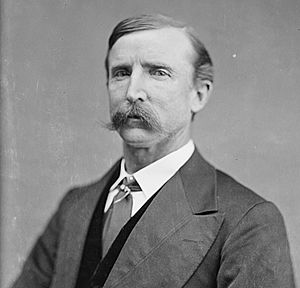John W. Caldwell facts for kids
Quick facts for kids
John W. Caldwell
|
|
|---|---|
 |
|
| Member of the U.S. House of Representatives from Kentucky's 3rd district |
|
| In office March 4, 1877 – March 3, 1883 |
|
| Preceded by | Charles W. Milliken |
| Succeeded by | John Edward Halsell |
| Personal details | |
| Born | January 15, 1837 Russellville, Kentucky |
| Died | July 4, 1903 (aged 66) Russellville, Kentucky |
| Resting place | Maple Grove Cemetery, Russellville, Kentucky |
| Political party | Democratic |
| Spouse | Sallie J. Barclay |
| Alma mater | Bethel College University of Louisville |
| Profession | Lawyer |
| Military service | |
| Allegiance | Confederate States of America |
| Branch/service | Confederate States Army |
| Rank | |
| Unit | 9th Kentucky Infantry |
| Battles/wars | American Civil War |
John William Caldwell (born January 15, 1837 – died July 4, 1903) was an important person from Kentucky. He served as a U.S. Representative for Kentucky. This means he helped make laws for the country in Washington, D.C.
Contents
Early Life and Education
John W. Caldwell was born in Russellville, Kentucky, on January 15, 1837. His parents were Austin and Louisa Caldwell. Sadly, his father passed away in 1843. This left John as the only living child.
Growing Up and Working
Because he had to help manage his father's property, John could only go to local schools. He attended schools in Logan and Christian Counties until he was fourteen. In 1850, he moved to Texas with his uncle. There, he worked on a farm, as a clerk, and as a surveyor.
Becoming a Lawyer
When John was nineteen, he returned to Kentucky. He decided to study law with William Morton, a well-known lawyer in his family. In 1856, he went to the University of Louisville School of Law. He finished his studies with honors in 1857. In 1858, he became a lawyer and started his own practice in Russellville, Kentucky.
John Caldwell married Sallie J. Barclay. They had one son and two daughters together.
Civil War Service
Even though John Caldwell did not agree with states leaving the United States, he joined the Confederate States Army in 1861. He started as a private, which is the lowest rank. But he was quickly chosen to be a captain. He led a group called the "Logan Grays." This group was being formed in Logan County.
Joining the Army
When Confederate soldiers entered Kentucky, Caldwell led his group to Bowling Green. There, they became Company A of the 9th Kentucky Infantry. This unit was part of a larger group led by John C. Breckinridge. After a general named Albert Sidney Johnson retreated, Caldwell took command of the 9th Kentucky.
Wounded in Battle
At the Battle of Shiloh, Caldwell was hurt several times. His left arm was badly broken. A large number of his company, about 65%, were killed or wounded in this battle. After the battle, he was promoted to major. Six weeks later, when the 9th Kentucky was reorganized, he was chosen as its lieutenant colonel. In 1863, he was promoted again to colonel and given command of the regiment. Sometimes, he even commanded a larger group called the Orphan Brigade.
Caldwell broke his left arm again at the Battle of Chickamauga. Army doctors offered him a medical retirement because of his injuries. However, he refused and rejoined his regiment in Dalton, Georgia, just two weeks later. At the end of the war, he surrendered his forces in Washington, Georgia. He was released as a prisoner of war on May 6, 1865.
Political Career
After the war, Caldwell went back to being a lawyer in Russellville. In August 1866, he was elected as a judge for the Logan County Court. He was reelected in 1870 and served for eight years.
Serving in Congress
Two years after he stopped being a judge, he was elected to the U.S. House of Representatives. He represented Kentucky's Third District as a Democrat. He served from March 4, 1877, to March 3, 1883.
In Congress, he was known for supporting certain ideas. He believed in "home rule," which means local governments should have more power. He also supported "tariff reform," which is about changing taxes on imported goods. He favored "hard money," meaning money backed by gold or silver. He also believed in being careful with government spending. He chose not to run for reelection because of his health, even though he likely would have won.
Later Life and Death
After his time in Congress, John Caldwell did not go back to practicing law. Instead, he became the president of the Logan County Bank. He passed away in Russellville on July 4, 1903. He was buried in Maple Grove Cemetery.
 | Dorothy Vaughan |
 | Charles Henry Turner |
 | Hildrus Poindexter |
 | Henry Cecil McBay |

